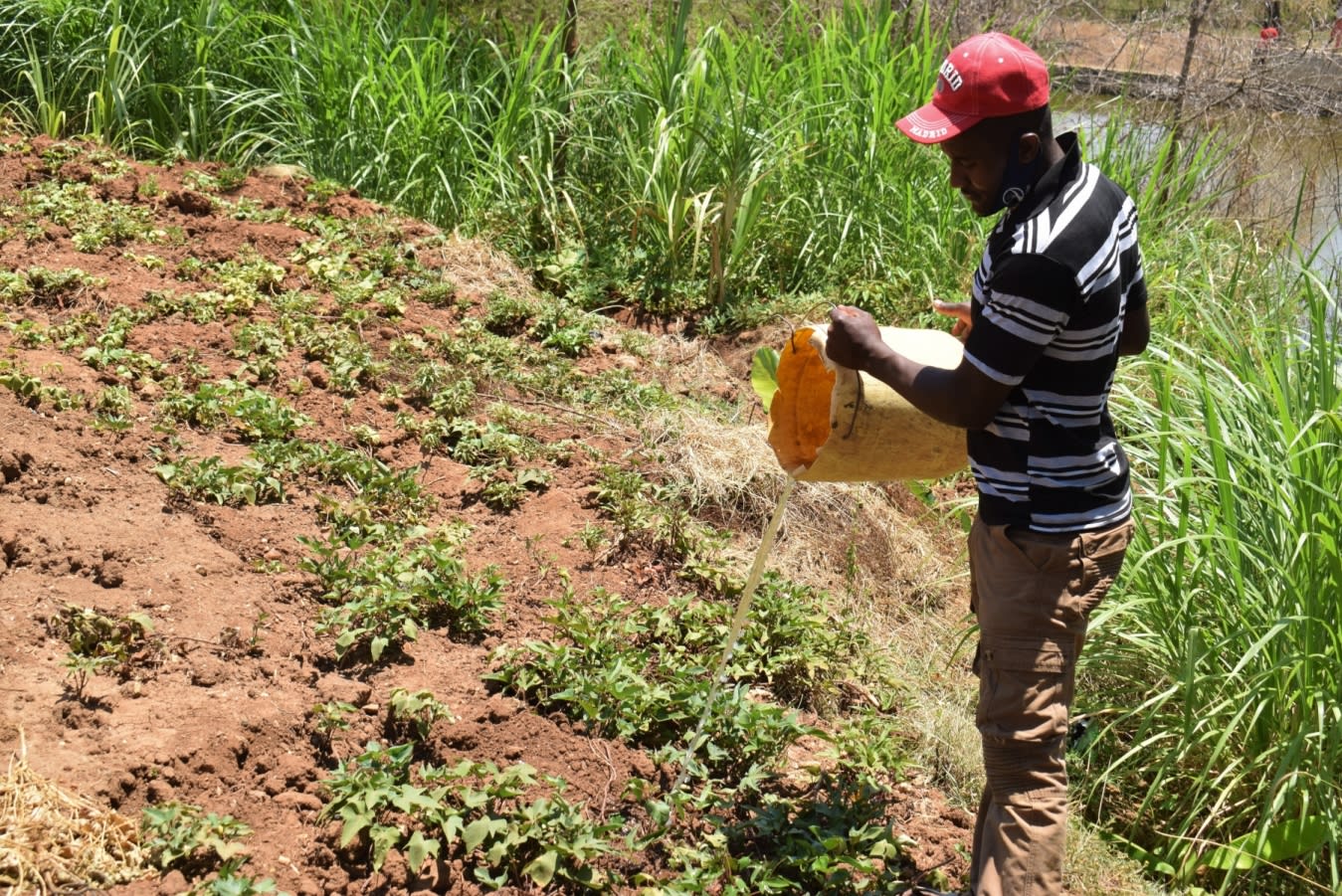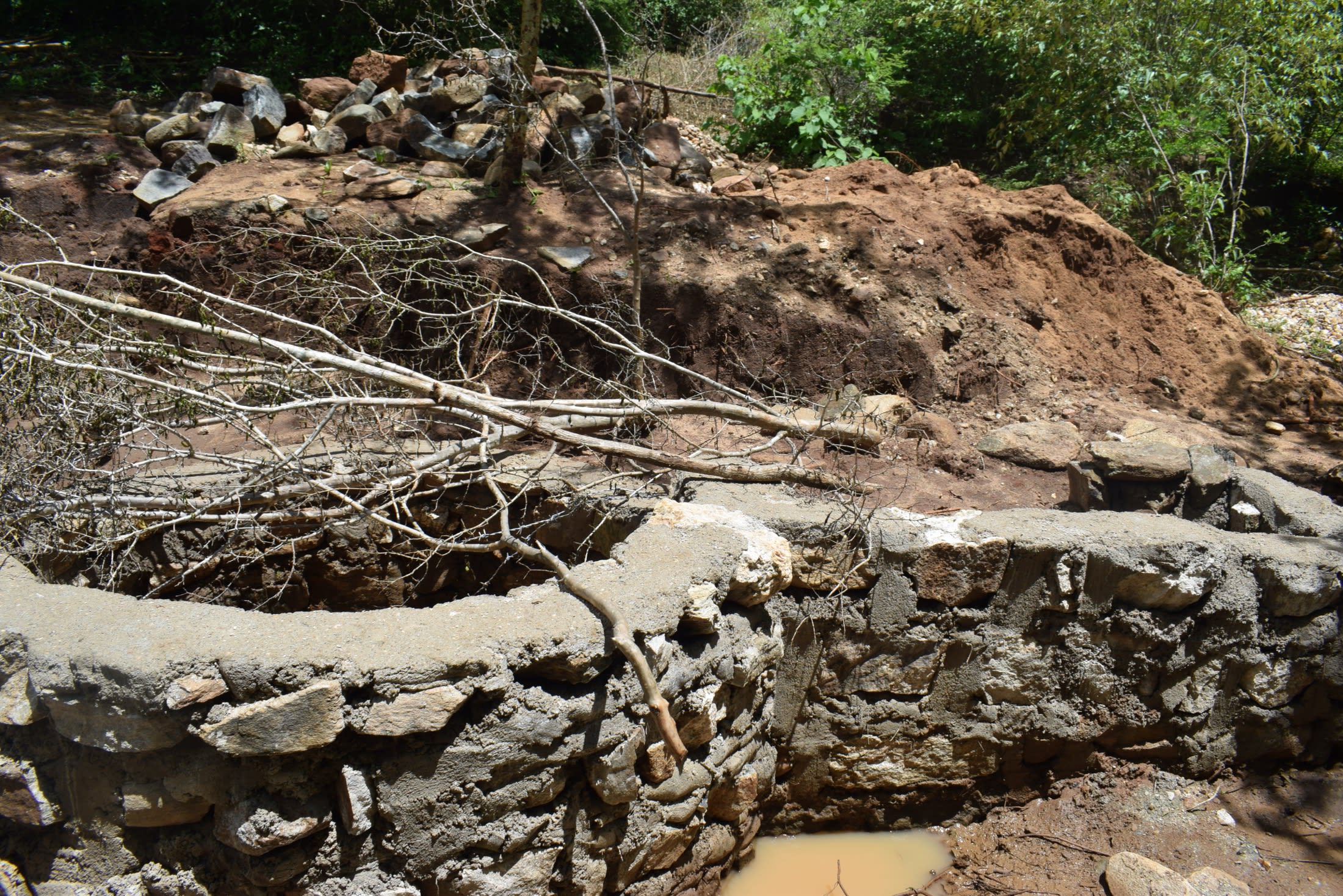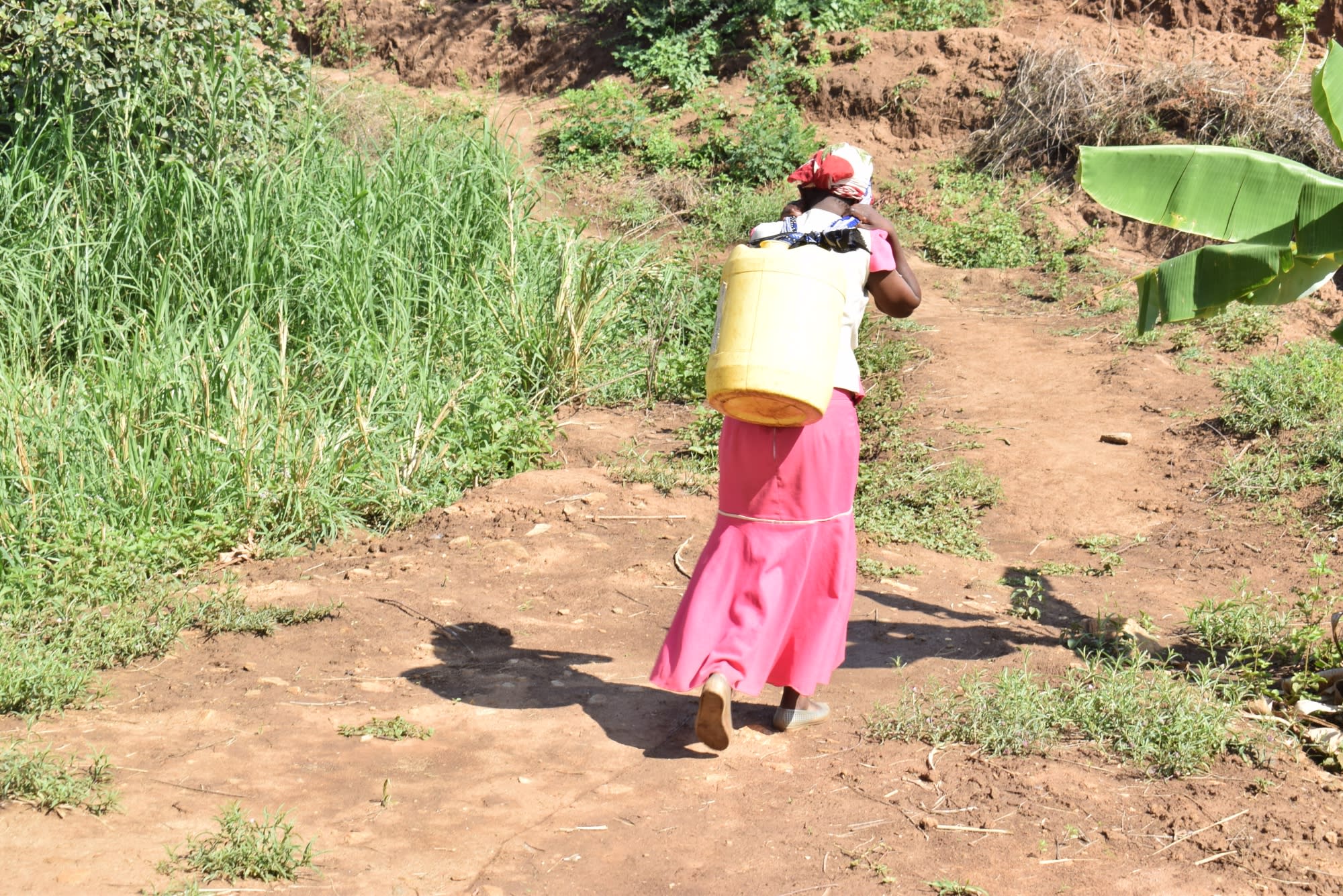October, 2020: Through Their Eyes: COVID-19 Chronicles with Matthew Mulandi
This post is part of a new series by The Water Project meant to highlight the perspectives and experiences of the people we serve and how the COVID-19 pandemic is impacting them. We invite you to read more of their stories here.

Matthew Mulandi and his family.
Our team recently visited Kithumba community to conduct a COVID-19 prevention training and monitor their well and dam. Shortly after, we returned to check in on the community, offer a COVID-19 refresher training, and ask how the pandemic affects their lives.
During this most recent visit, Matthew Mulandi shared his story of how the coronavirus is impacting her life and his community.
Field Officer Lilian Kendi met Matthew outside his home to conduct the interview. Both Lilian and Matthew observed physical distancing and other precautions throughout the visit to ensure their health and safety. The following is Matthew's story, in his own words.
What is one thing that has changed in your community since the completion of the water project?
"A lot has changed since the installation of this water point. We have plenty of water to plant trees and vegetables such as kales, spinach, onions, and tomatoes for domestic use at our homes and sale. Generally, farming projects have intensified thanks to this water project. Community members no longer have to walk for long distances to fetch water. This has enabled them to save more time to engage in other income-generating activities."
How has having a clean water point helped you through the pandemic so far?
"Having a clean water point has helped us provide water for drinking, bathing, washing clothes, and other household uses at our homes."

Since the outbreak of COVID-19 in Kenya, has fetching water changed for you because of restrictions, new rules, or your concerns about the virus?
"Yes, a lot has changed for me since the outbreak of COVID-19. Following the restrictions provided by the government, I have had to practice handwashing before and after using the shallow well's hand pump, observe social distancing at the well to avoid contact, and wear a mask whenever I leave the house to go and fetch water."
How has COVID-19 impacted your family?
"The economy has become unstable since the onset of the virus. Casual labor jobs are not well paying as they were before, which has reduced the income earned at the household level. I had to send my wife and family to live with the extended family at my matrimonial home due to the changing times as I could not provide for them as consistently as I did before."
What other challenges are you experiencing due to the COVID-19 pandemic?
"Our income is unstable due to the lack of jobs. The economy is still rocky hence making it hard for us to engage in businesses as usual. My daughter was to join school this year, but that is not possible due to its closure."

Matthew watering his farm with water from the well.
What hygiene and sanitation steps have you and your community has taken to stop the spread of the virus?
"We took the following hygiene and sanitation steps to stop the virus: wearing masks, social distancing, washing hands with soap and clean water, and avoiding crowded places."
Like most governments worldwide, the Kenyan government continues to set and adjust restrictions both nationally and regionally to help control the spread of the virus.
What restriction were you most excited to see lifted already?
"There were age restrictions set when going to church, but they have been lifted, which has allowed all age groups to attend church. The elderly can now provide counsel to the young generation. The opening of the marketplace has allowed businesses to start picking up gradually."

Matthew Mulandi
What restriction are you still looking forward to being lifted?
"I look forward to the opening of schools so that my daughter can officially join pre-school."
When asked where he receives information about COVID-19, Matthew listed the radio and our team's sensitization training.
What has been the most valuable part of the COVID-19 sensitization training you received from our team?
"Through this sensitization training, I learned the importance of handwashing at all times, social distancing, and proper hygiene and sanitation."

February, 2020: Kithumba Community Hand-Dug Well Complete!
Kithumba Community, Kenya now has a new source of water thanks to your donation. A hand-dug well was constructed adjacent to a sand dam (go here to check the dam out). The dam was constructed on the riverbed, which will build up sand to raise the water table and naturally filter water.
It could take up to 3 years of rain (because sometimes it only rains once a year!) for this sand dam to reach maximum capacity. As the sand dam matures and stores more sand, a supply of water will be available for drinking from the well. With this water, the surrounding landscape will become lush and fertile.
"We are pleased that the project is complete and that it will enable us to have an adequate supply of water in our community. All the community members will now access water a stone's throw away from their homesteads," said Daniel Muunge, a farmer who is a member of the self-help group.

"In addition, the water point is safe and very easy to operate even for the children. We are grateful and expectant for the changes and developments that are yet to be experienced in this area."
Hand-Dug Well
Construction for this well was a success!

We worked with the Kakwa Self-Help Group for this project. The members and their families contributed materials and physical labor to complete the project. In addition, they were trained on various skills such as bookkeeping, financial management, project management, group dynamics, and governance. We also conducted a hygiene and sanitation training to teach skills like soapmaking and to help improve behaviors such as handwashing.
When an issue arises concerning the water project, the group members are equipped with the necessary skills to rectify the problem and ensure it works appropriately. However, if the issue is beyond their capabilities, they can contact our team of field officers to assist them.
Hand-Dug Well Construction Process
We delivered the experts, materials, and tools, but the community helped get an extraordinary amount of work done too. They collected local materials to supplement the project, including sand, stones, and water.

A hole 7 feet in diameter is excavated up to a recommended depth of 25 feet. (Most hand-dug wells do not reach that depth due to the existence of hard rocks between 10-18 feet).
The diameter shrinks to 5 feet when construction of the hand-dug well lining is completed. This lining is made of brick and mortar with perforations to allow for water to seep through. Sand builds up around the well walls, which will naturally filter the rainwater that is stored behind the dam.

Once the construction of the lining reaches ground level, a precast concrete slab is laid on top and joined to the wall using mortar. 4 bolts for the hand-pump are fixed on the slab during casting. The concrete needs to dry for 2 weeks before the pump is installed.
The mechanics arrive to install the pump as community members watch, learning how to manage simple maintenance tasks for themselves.

The well is then given another few days after installing the pump to allow the joints to completely dry. The pump was installed level with the top of the sand dam. As the dam matures, sand will build up to the top of the wall. Until then, people will climb the concrete steps to get their water.

New Knowledge
The trainer conferred with the field staff about their previous visits to households and interviews with community members to determine which topics the community still could improve upon. This is the third project we have completed with this self-help group, so much of the focus was on determining what areas are in need of refreshing or improvement. Some 23 group members attended, as well as 1 church leader, 1 school leader, and 1 retired government leader.

The members converged at Simon Kituku’s homestead. Simon is a member of this group and his homestead was a central venue to most of the members. It also provided protection for everyone since it was raining on the day of the training.
They decided to train on topics including water treatment; latrine hygiene; the transmission of diseases; how to make a handwashing station; and making kerol (household cleaning detergent). Making kerol was a new idea that was introduced to the members. The members claimed that it was something they have yearned for a long time due to the state of their latrines. They were very excited to learn the idea that will enable them to improve their sanitation. They were also excited by the possibility of selling the kerol to their neighbors to make a small income.

“The training was good as we have been reminded of many things that we had forgotten about hygiene and sanitation. The training will help us to improve the hygiene standards of our families," said Mr. Muunge.
"The kerol-making training will enable us to keep our latrines clean as they will be germ-free and the number of flies will reduce.”
From the facilitator's perspective, the training increased the knowledge of the community members on hygiene and sanitation and this will help them to prevent diarrheal diseases. The training on how to make kerol was highly applauded and adopted by the members. It will help them to generate income thus improving their living standards.
Thank you for making all of this possible!


 Protected Dug Well
Protected Dug Well
 Rehabilitation Project
Rehabilitation Project


































